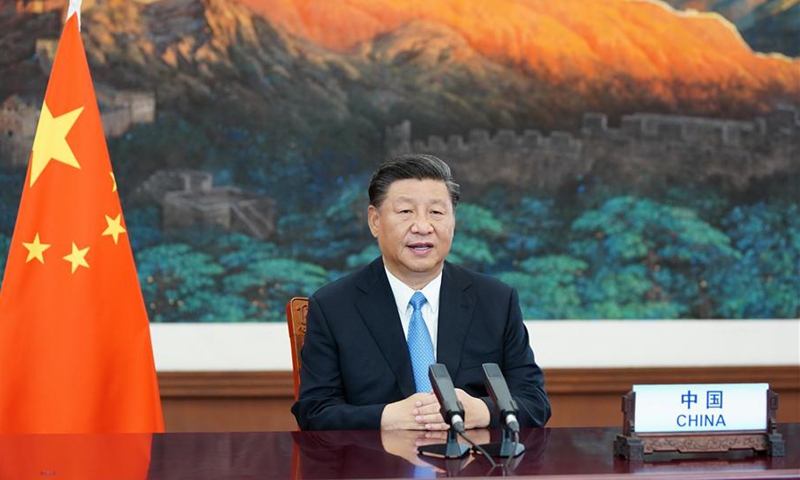At UN, US talks trash, China fortifies truth
Source: Global Times Published: 2020/9/23 9:43:40

Chinese President Xi Jinping addresses the General Debate of the 75th session of the United Nations General Assembly via video on September 22, 2020. Photo: Xinhua
Editor's Note:Both Chinese President Xi Jinping and US President Donald Trump on Tuesday delivered a virtual address at the General Debate session of the United Nations (UN) General Assembly. Trump groundlessly slandered China from the beginning and nearly half of his speech was directed at China. Xi, by sharp contrast, hailed multilateralism and rejected both hot and cold war. How to understand the addresses by the two leaders? What messages did they convey to the international community? Three Chinese experts shared their views with the Global Times on these issues.
Jin Canrong, associate dean of the School of International Studies, Renmin University of China
The US has topped the world in terms of the numbers of coronavirus infections and deaths. Instead of reflecting upon himself, Trump made China the scapegoat of his domestic failures as he spoke at the UN General Assembly. Any one sensible in the US and in the world (and those who believe in science) will not be played as a fool with this slanderous speech.
Trump's words are indecent and disregard diplomatic etiquette. It was bizarre behavior for him to vent his own sentiment toward another country while touting his own alleged achievements, especially on multilateral and diplomatic occasions. This is particularly true when he needs cooperation badly.
His speech at the UN General Assembly can be seen as a part of his election campaign that only caters to a domestic audience. As the US society is highly divided, Trump's supporters may buy into his wired logic. Internationally, US followers, such as Australia and Canada, both of whom are Five Eyes allies, may echo Trump's talking points too.
Sun Chenghao, an assistant research professor at the Institute of American Studies, China Institutes of Contemporary International Relations
Xi said in his speech that China "will never seek hegemony, expansion, or sphere of influence" and that "China has no intention to fight either a cold war or a hot war with any country."
The US-led Western media has been sensationalizing buzz words like "new cold war" and even "a hot war" between China and the US. Xi's speech can be seen as a response to such hyped-up language - China does not want to be dragged into a new cold war with the US. This stance is consistent. China does not want to be trapped in Western discourse. China and the US have plenty of room for cooperation.
By contrast, Trump attacked the World Health Organization and made China the scapegoat for his pandemic failures. This was very inappropriate and reflects his disdain for multilateralism and UN mechanisms.
Since Trump took office, the core of his foreign policy is to stick to unilateralism and the "America First" doctrine. He attacks whatever he deems contrary to US interests in a high-handed manner.
Trump views the UN as a stage to play out his election campaign and political ambitions. He touted his economic and anti-virus "achievements" and advocated his "America First" policy, instead of uniting other countries to engage in cooperation against the virus, or anything actually. When he talked about the vaccines, he talked about only the US. This was unlike China, which promised to share the results with other countries.
The COVID-19 pandemic has posed tremendous challenges to global governance, globalization and multilateralism. Xi's speech injected momentum for these. Countries can cope with these challenges and realize development only via cooperation, not empty campaign rhetoric.
Su Hao, founding director of the Center for Strategic and Peace Studies, China Foreign Affairs University
The two leaders' speeches show two totally different styles. Trump's speech echoed the unilateralism of the US. He used the UN General Assembly as a stage to serve his political interests. This is irresponsible to the international community. Using the derogatory term "the China virus" to refer to the raging novel coronavirus pandemic and asking the UN to "hold China accountable" are disgusting practices. Trump's attempt to put China on the opposite side of the whole world and instigate the international community to be hostile toward China only serves the US' strategy to counter China.
Trump's speech didn't mention anything about the development of the UN, multilateralism, or joint effort of the international community. What Trump was concerned with was merely the status and national interests of the US. He underlined his "America First" policy, but completely neglected multilateral institutions and global peace and development. Trump's narrative embodies the trend that the US is going backward. His words were inappropriate on this multilateral stage.
Posted in: VIEWPOINT